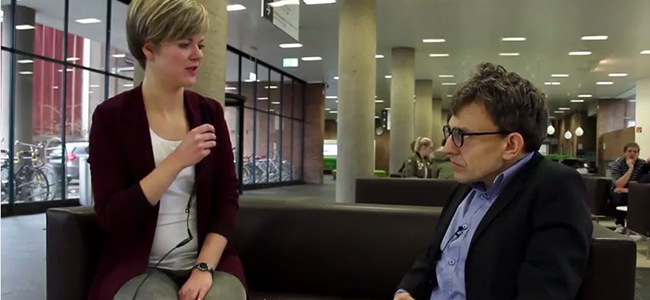Der VW-Abgas-Skandal wird seit Monaten in den Medien diskutiert. Wie konnte es zu dem Skandal kommen? Inwiefern muss sich die Einstellung von Manager*innen in Zukunft ändern? Professor Bernd Irlenbusch gibt Antworten in der Video-Serie "A coffee chat with ...", in der junge Journalist*innen Professor*innen zu aktuellen wirtschaftlichen und politischen Themen befragen. Bernd Irlenbusch ist Professor für Unternehmensentwicklung und Unternehmensethik an der WiSo-Fakultät.
Hier geht es zum YouTube-Video des Interviews mit Bernd Irlenbusch.
Das Interview können Sie auch hier nachlesen:
„Business needs more moral“
Interview with Professor Bernd Irlenbusch
The German Volkswagen group cheated on emission tests in the US to fullfil the country’s technical requirements. Mr. Irlenbusch, do managers of today have no morals?
No, I wouldn’t argue like that. In fact it has become much more complicated for managers to lead an organisation in an ethical way. For example the interaction between employees and other stakeholders has become more complex. Additionally companies act globally and need to take different cultural, social and legal norms into consideration. Given these constraints it is no longer enough that employees and managers know about ethics theories. It needs more to change behaviour.
The Volkswagen group likes to present itself as a social and environmentally-friendly company. In spite of this it came to a scandal. How could this happen?
Research shows that unethical behaviour occurs in a systematic way. First there is a behavioural tendency called Moral Licensing: People who consider themselves as very moral think that this would provide them with a license to sometimes cross the line. Secondly there is a behavioural tendency called Slippery Slope: It has been found that people have difficulties to perceive own moral transgressions or those of others as being unethical if they come in small additive steps.
Could you explain this referring to Volkswagen in detail?
I will give an example for the Slippery Slope effect: Volkswagen like other companies of the automobile sector has always been achieving better results in emission tests by using small tricks: For example they used smaller tyres or only half-full batteries while testing. So the decision to manipulate software was only one further step on the already taken path and could be interpreted as grey area.
Who is the person responsible?
In many companies the responsibility diffuses along the hierarchical line. The boss wants his employee to do everything for achieving a certain goal – he doesn’t really want to know how, the main thing is that the result is satisfying. So he delegates responsibility. But his employee isn’t aware of any responsibility either because he only does what his boss wants him to do.
What do managers of tomorrow need to change so that they will be able to avoid such a behaviour in their business and further scandals?
The managers of the future need to know more about behavioural tendencies that might lead to unethical conduct, like the ones I have explained - Moral Licensing, Slippery Slope and Diffusion of responsibility – in orderto avoid inappropriate behaviour in their companies. If a manager knows about the slippery slope effect, for example, he will be vigilant to recognize the first steps into the direction of unethical decisions in order to prevent more such steps down the slope – and maybe also a further scandal.
Do managers of tomorrow need another attitude?
Nowadays many people think that private values like honesty or fairness don’t belong to business. But managers of tomorrow must be encouraged to bring their own values into the working life. So it would be possible that more ethical decisions will be made in companies. That’s something I also often tell my students.
Professor Irlenbusch, thank you for talking with us!
Interview: Jennifer Garic & Kristina Wollseifen
